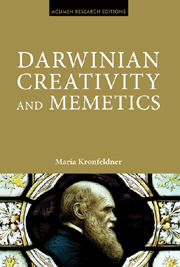4 - Guided variation
Summary
The claim that creativity is based on undirected variation has been strongly criticized. As the deity introduces novelty in a directed way through wisdom, plan and purpose, critics claim that human creativity is equally based on wisdom, plan and purpose, even if humans are not as perfect as an alleged creator-deity. Whether creativity is blind or not (and in which sense) is the most frequently reoccurring and hotly debated issue with respect to Darwinian thinking and the origination of novelty in culture. I shall systematize and develop the critics' core argument in the next section. This leads to three kinds of compatibility arguments: arguments that state that the critique, although correct, does not destroy the analogy. By distinguishing between three meanings of blind variation, and by discussing these compatibility arguments, I shall provide a new and well-balanced critique of the blind-variation analogy that takes the points of its critics as well as of its defenders into account. However, my conclusions are not in favour of the blind-variation analogy. The three compatibility arguments either fail or end up in rather trivial claims.
VERSIONS OF GUIDED VARIATION
Critics claim that our orientation towards certain problems makes variation in cultural novelty directed, be it creative novelty in the narrow sense or not. In culture, we have guided variation, not undirected variation. I shall start with two variants of this objection: one at a populational level, the other at a cognitive level.
- Type
- Chapter
- Information
- Darwinian Creativity and Memetics , pp. 53 - 74Publisher: Acumen PublishingPrint publication year: 2011

